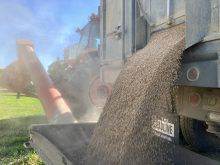News that the Canadian Grain Commission postponed undertaking millions of dollars in maintenance costs until its cost recovery fees were in place isn’t sitting well with farmers facing huge increases in service costs.
Blacklocks Reporter, an online news service, obtained the Canadian Grain Commission Business Plan 2013-14 through federal Access to Information. In it, the commission says it postponed maintenance charges for several years that must now be paid. The CGC’s fees to farmers and grain companies tripled last August under a government plan to shift most of the cost of operating the commission to the industry.
Read Also

Tie vote derails canola tariff compensation resolution at MCGA
Manitoba Canola Growers Association members were split on whether to push Ottawa for compensation for losses due to Chinese tariffs.
Details of deferred costs are cited in a document, Blacklocks said in citing the business plan. “The commission has consistently deferred capital spending that has placed stress on aging equipment and increased the risk of rust-out. The commission had planned to spend $35 million over a five-year period. Currently the commission is in the second year of this plan and is $15 million behind in its delivery.”
Commission files showed universal opposition to the fee policy from farm groups and grain dealers, Blacklocks noted. Petitioners described the policy as “worrisome, excessive and not competitive with private industry.”
Doug Chorney, president of Keystone Agricultural Producers, told Blacklocks that, “We are hearing a lot from our membership on those fees. “We acknowledge the government has to move to a user-pay system, but it must be even keeled. Those costs are ultimately borne by producers.”
Chorney predicted the fee hikes will see more Canadian growers bypass the system where possible, noting he shipped spring wheat from his own farm in East Selkirk to a U.S. elevator to avoid excessive fees.
“If we can’t be competitive, farmers who are able will simply bypass the Canadian system,” Chorney said. “Farmers are paying too much, and we all know we’re paying too much.”
- More from the Manitoba Co-operator: Canadian Grain Commission seeks fairer funding model
Last year, Ron Bonnett, president of the Canadian Federation of Agriculture, said that a 5,000-acre farm that grows crops for export, will see CGC fees increase on average to $12,000 a year from $8,000 a year.
He said the government failed to recognize the public good created by grain exports that create thousands of jobs in transportation, ports and other services and was simply dumping all the cost increase onto producers.
Grain Growers of Canada, said that not only are fee increases huge, they fall disproportionately on the farmers whose crops are sold overseas. That means one-third to a half of farmers will be paying nothing because their crops are sold in Canada or the United States.
The commission’s fees for ensuring the quality and grade of export grain haven’t been increased since 1991. The farm groups accepted the need for an increase to pay for the commission’s activities, but they said the government should recognize grain production has a value to the national economy and support part of the CGC’s costs. The farm groups say a fair figure is 20 per cent of the commission’s budget but the Harper government has cut its support to about 10 per cent.
They have also repeatedly told the government that if farmers are to pay the bulk of the costs, then they should have a say in the commission’s operation and especially in the kinds of services it provides. The government hasn’t acted on that request.
Blacklocks found the following rate hikes:
- A one-third increase in producer rail car fees from $20 to $26.50;
- A tripling of ship inspection fees from 51 cents per tonne to $1.60;
- A 360 per cent rise in full-time primary elevator licences from $60 per month to $276;
- A 397 per cent increase in rail car, truck and container inspections from $29 to $145;
- An 840 per cent increase in grain reinspection fees from a minimum $7.50 to $70.48;
- The quintupling of grain dealers’ licences from $1,200 to $6,000 a year.














